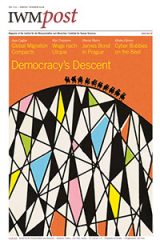

In collaboration with
Institute for Human Sciences
The Institute for Human Sciences / Institut für die Wissenschaften vom Menschen (IWM) is an independent institute for advanced study in the humanities and social sciences. Since its foundation in 1982, it has hosted more than 1500 scholars, journalists and translators from all over the world. Many of the Institute’s Permanent and Visiting Fellows are regular contributors to Eurozine or its focal points Eurasia in Global Dialogue and Ukraine in European Dialogue (see below).
Website: www.iwm.at
Twitter: @IWM_Vienna
Youtube: IWMVienna

Articles
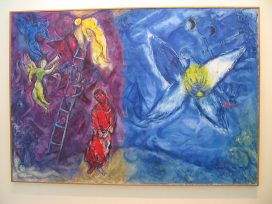
Ongoing discourse about a collective Belarusian identity since the 2020 protests tend to circle around nationalism. Those who opposed the regime and managed to escape call for horizontal societal structures, in solidarity with those imprisoned. Belarusian culture is more than language; it includes human rights, economic interests and everyday narratives.
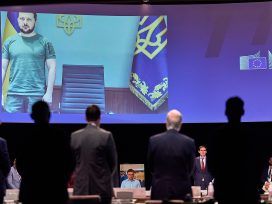
The war crimes charges brought by the ICC against Putin are a breakthrough. But built-in safeguards of national interest, combined with an incomplete patchwork of mechanisms and jurisdictions, mean a long way ahead before Russia is prosecuted under international law for the crime of aggression.
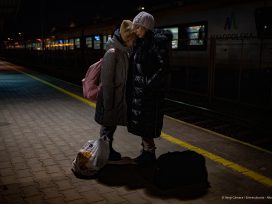
Women forced to leave their homes during war face gender specific dangers. Mobile phones and refugee-targeted apps can be either a lifeline or an unforeseen trap, associated with rape and trafficking. How could the West’s innovative digital response to sexual health and exploitation be improved?

The imprisoned Belarusian opposition politician Maria Kalesnikava has been in a critical condition since the end of November. In October she was awarded an honorary professorship at the University of Salzburg. The philosopher Olga Shparaga, a fellow member of the exiled Coordination Council, pays tribute to a feminist legend.
Focal points
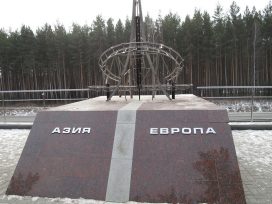
The focal point presents the findings of the project ‘Eurasia in Global Dialogue’ being carried out at the Institute for Human Sciences, Vienna (IWM). The focal point is an extension of the earlier focal point, ‘Russia in Global Dialogue’ that ran in Eurozine and at the IWM from 2012–2018.

Post-revolutionary Ukrainian society displays a unique mix of hope, enthusiasm, social creativity, collective trauma of war, radicalism and disillusionment. With the Maidan becoming history, the focal point ‘Ukraine in European Dialogue’ explores the new challenges facing the young democracy, its place in Europe, and the lessons it might offer for the future of the European project.
Projects and publications
